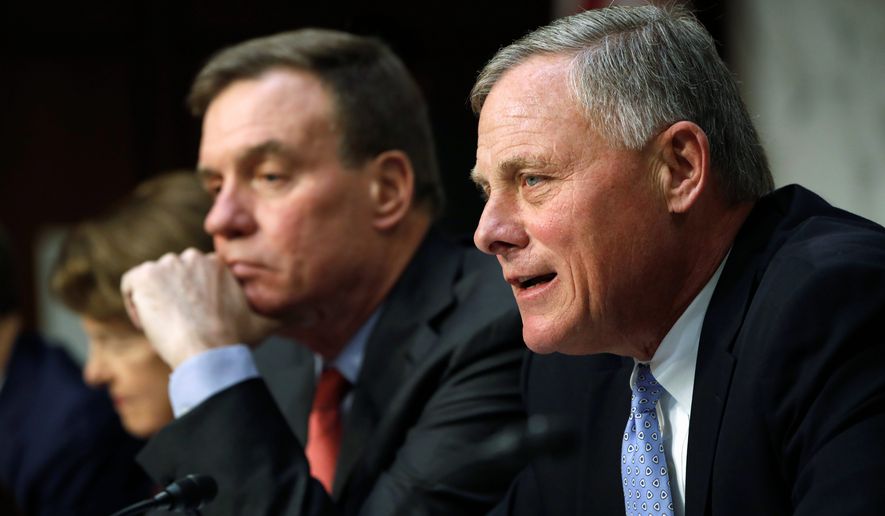It was extensive and ambitious, but it wasn’t particularly sophisticated.
The shadowy Kremlin propaganda operation to meddle in the U.S. presidential election last year ran four times as many Facebook ads in the deep-blue state of Maryland than it did in more-critical swing states such as Wisconsin, the head of the Senate Select Committee on Intelligence revealed Wednesday.
Sen. Richard Burr, North Carolina Republican, said the 55 ads in Wisconsin — costing less than $2,000 total — were virtually all run before the state’s primary, and none mentioned candidate Donald Trump by name, suggesting they were less about boosting the candidate and more about sowing general chaos.
The findings provided little support for Democratic complaints that a wide-ranging, surreptitious Russia social media assault helped sway the election to Mr. Trump over Democratic rival Hillary Clinton.
Still, officials from Silicon Valley’s top tech and social media firms faced a second straight day Wednesday of withering criticism on Capitol Hill, as Facebook, Twitter and Google executives tried to explain their inability to stop Russian propaganda from exploiting their social media platforms.
The normally hypercompetitive tech giants have shown Washington a unified front while defending the historic breach as a way to cool lawmakers’ desire for tougher oversight of their industry.
In a highly anticipated move, the House Permanent Select Committee on Intelligence — in addition to blasting the firms for nontransparency and stonewalling — released dozens of examples of the Russian-bought Facebook ads and account names designed to whip up tensions around divisive social issues.
Committee investigators displayed the ads — enlarged on poster boards — around the committee hearing room. Bunched together, they conveyed a visceral nastiness and anger.
One Facebook ad touted an event to “Support Hillary. Save American Muslims!” with a picture of a woman in a hijab beside Hillary Clinton. Another, for a group called “Stop A.I.,” urged viewers to “like and share if you want burqa banned in America” because the full-body covering could be hiding a terrorist.
Several used broken English and had punctuation mistakes, like a coloring book for Bernard Sanders supported by a group calling itself “LGBT United,” which read: “stop taking this whole thing too serious. The coloring is something that suits for all people.”
In preparation for this week’s congressional hearings, Facebook disclosed that content generated by a Russian group, the Internet Research Agency, reached as many as 126 million users. Facebook earlier turned over more than 3,000 advertisements linked to that group.
U.S. intelligence agencies have said the Russian government exploited social media as part of a sprawling and surreptitious campaign to influence the presidential election in favor of Mr. Trump.
During Wednesday’s Senate hearing, Mr. Burr said the narrative that Russian-backed operatives worked to boost Mr. Trump over Mrs. Clinton was false.
“I understand the urge to make this story simple,” he said. “But that’s biased.”
Sen. Marco Rubio, Florida Republican, warned that Russian misinformation would continue. “These operations, they’re not limited to 2016 and not limited to the presidential race, and they continue to this day,” he said.
Sen. Mark R. Warner of Virginia, the committee’s ranking Democrat, aimed his opening statement directly at the Kremlin.
“Russian operatives are attempting to infiltrate and manipulate American social media to hijack the national conversation and to make Americans angry, to set us against ourselves and to undermine our democracy,” he said. “They are still doing it now, and not one of us is doing enough to stop it.”
He then lashed out at Facebook for a continued lack of responsiveness to the committee’s efforts to obtain data from the social media behemoth.
“I have more than a little bit of frustration that many of us on this committee have been raising this issue since the beginning of this year, and our claims were frankly blown off by the leadership of your companies,” Mr. Warner said.
Colin Stretch, Facebook’s general counsel, attempted to push back. “We’ve provided all the information we can about the content that we’ve identified on the system,” he said.
On Tuesday, executives from the firms were criticized by a Senate judiciary subcommittee exploring Russian election interference. The firms didn’t seem to convince lawmakers that a similar propaganda push by the Kremlin could be stopped before the next general election.
During the House hearing, lead Democrat Rep. Adam B. Schiff of California framed the problem in terms of Silicon Valley’s business model, which requires viral content.
“Part of what made the Russia social media campaign successful is that they understood algorithms you use that tend to accentuate content that is either fear-based or anger-based,” Mr. Schiff said.
Mr. Warner explained that the Kremlin’s propagandists had a deep understanding of social media.
“For Facebook, much of the attention has been focused on the paid ads Russian trolls targeted to Americans,” he said. “However, these ads are just the tip of a very large iceberg. The real story is the amount of misinformation and divisive content that was pushed for free on Russian-backed pages, which then spread widely on the news feeds of tens of millions of Americans.”
To highlight his point, he showed a blow-up of a post that circulated widely on Facebook featuring an illustration of a shirtless Jesus and a devil-horned Mrs. Clinton staring down each other in the manner boxers do before they fight.
• This article is based in part on wire service reports.
• Dan Boylan can be reached at dboylan@washingtontimes.com.




Please read our comment policy before commenting.